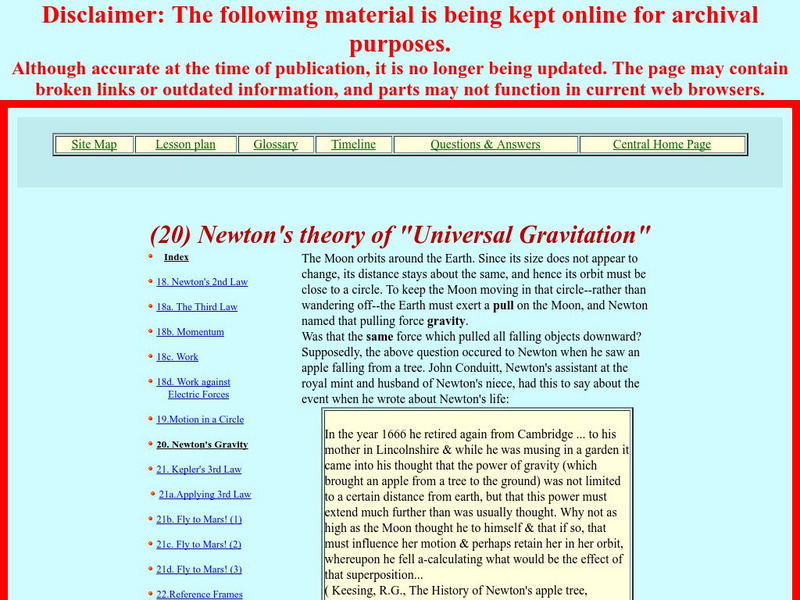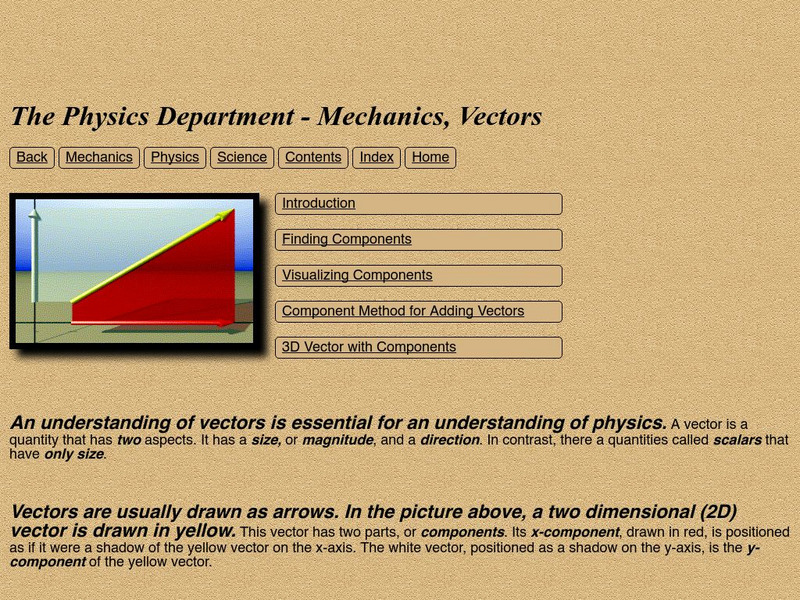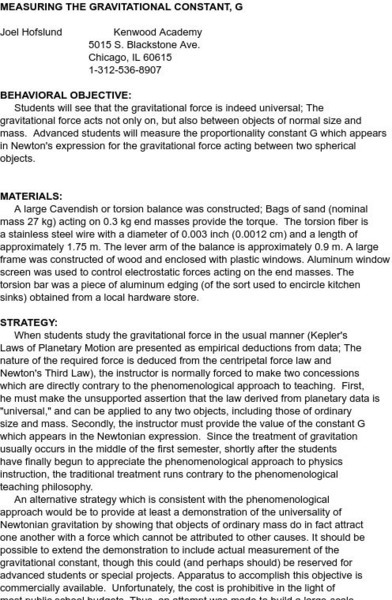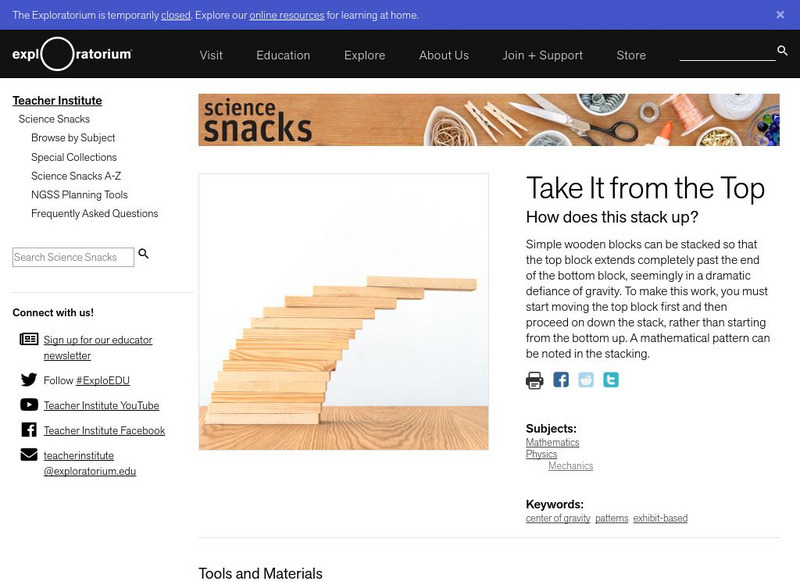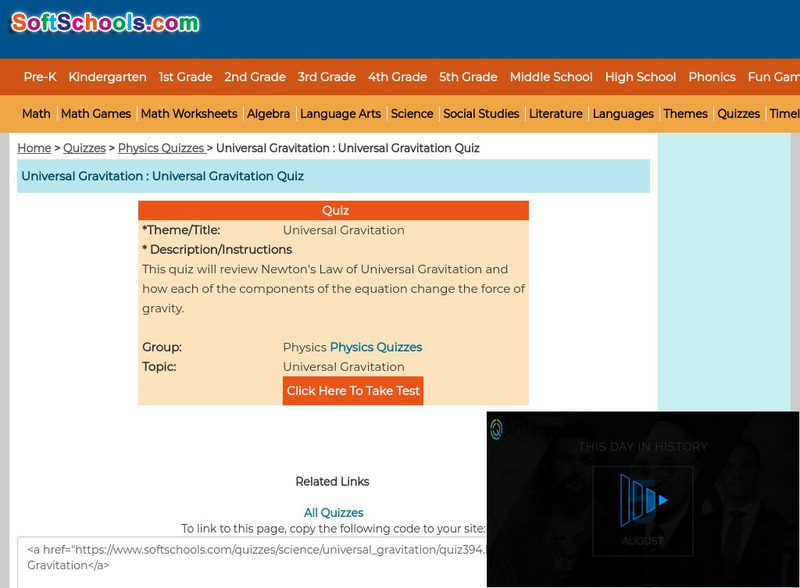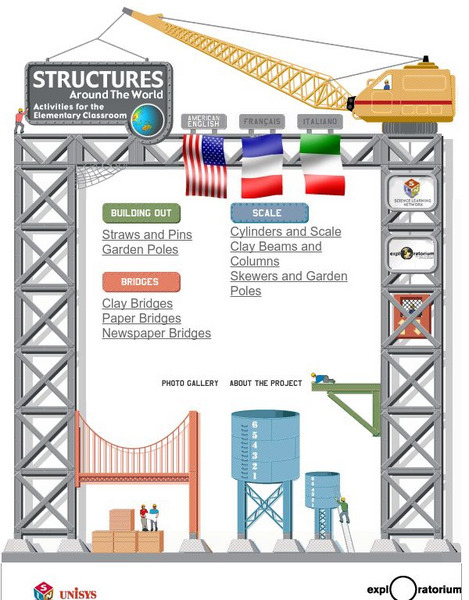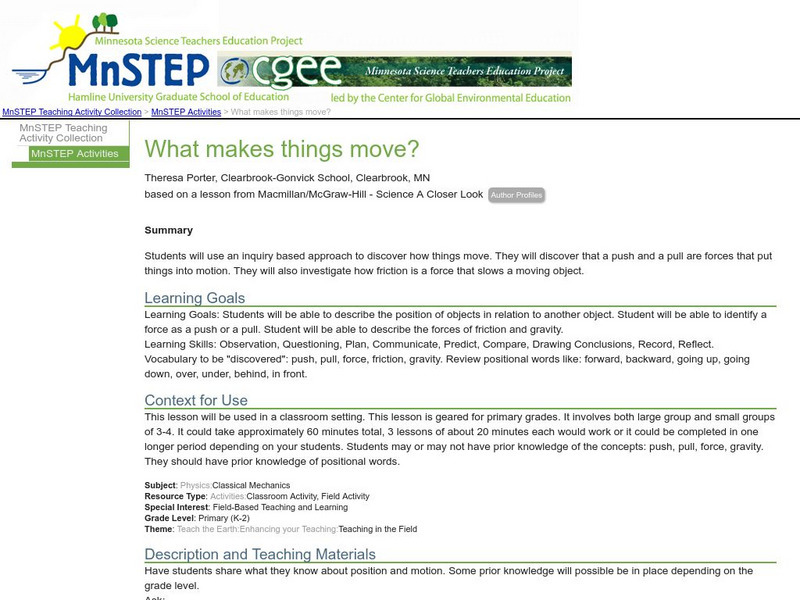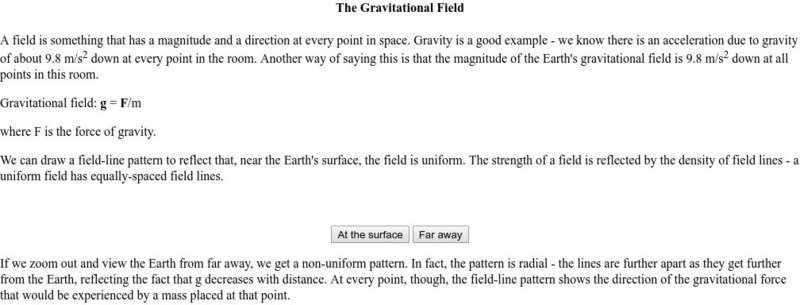NASA
Nasa: Newton's Theory of "Universal Gravitation"
This site, which is provided for by NASA, discusses the thinking which led Newton to understand universal gravitation.
Curated OER
Zona Land: Mechanics and Vectors
An exceptional tutorial on the topic of vectors that offers many helpful graphics, some of which are interactive.
NOAA
Noaa: Free Fall Determination of Newtonian Constant of Gravity
Descriptions of an experiment performed by geologists to determine the Newtonian constant of gravity, or "G". Highly sophisticated reading.
Science and Mathematics Initiative for Learning Enhancement (SMILE)
Smile: Measuring the Gravitational Constant, G
A demonstration/lab idea for determining the numerical value of the universal gravitation constant using a torsion balance.
Exploratorium
Exploratorium: Science Snacks: Take It From the Top
Students defy gravity by stacking blocks in different ways in this exercise. Other projects are linked to this lesson as well.
Utah Education Network
Uen: Gravity: Head for the Hills
Using this interactive resource will involve making predictions about the effects of gravity in different conditions.
Other
Steve Spangler Science: Soda Bottle Prank
This resource demonstrates atmospheric pressure using a soda bottle and water.
Exploratorium
Exploratorium: Your Age on Other Worlds
Enter your birthday and find out how old you are on the other planets in the Milky Way Galaxy. Understand why our age is different on each planet.
Soft Schools
Soft Schools: Physics Quizzes: Universal Gravitation
Assess your understanding of Newton's Universal Law of Gravitation with this interactive multiple choice quiz. Immediate feedback is provided.
Georgia State University
Georgia State University: Hyper Physics: Earth Orbit Velocity
A discussion and statement of an equation for orbital speed. An interactive JavaScript form allows the user to investigate the relationship between orbital height and orbital speed. A very good opportunity to practice and receive...
Physics Classroom
The Physics Classroom: Newton's Law of Universal Gravitation
States the equation of Newton's law of universal gravitation. States the value of G and uses the equation to solve problems.
Exploratorium
Exploratorium: Structures Around the World
How does that bridge stay up? What are the forces acting on that column? This site helps students understand how structures can be built by having them build their own. Also provides images of real structures for kids to compare with...
Science Education Resource Center at Carleton College
Serc: Mn Step: What Makes Things Move?
In this activity, students will learn about push and pull forces that make things move. They will also practice using position words to describe location. To learn about forces, they will move objects, observe the movement of objects and...
Physics Classroom
The Physics Classroom: Circular and Satellite Motion: Gravity More Than a Name
This tutorial is intended for students to strengthen their understanding of gravitation and understand the nature of this force.
Physics Classroom
The Physics Classroom: Circular and Satellite Motion: Energy in Satellites
Through interactive practice problems and illustrated examples, students explore energy relationships for satellites.
NASA
Nasa: Vectors
This site from NASA provides an excellent tutorial on vectors and their use in physics to describe the motion of objects. Vector addition and resolution are illustrated.
Khan Academy
Khan Academy: Testing New Suture Material
This passage will test your knowledge on the force of tension when testing a new suture material using this five-question quiz.
Boston University
Boston University: The Gravitational Field
Defines what a gravitational field is, its value, and how to calculate it. Field-line patterns are also drawn and explained.
PBS
Pbs Teachers: Submarine Race Experiment
Balance the force of gravity with the force of the expanding gasses created by mixing baking soda and vinegar. Create a soda bottle submarine that sinks to the bottom of the bathtub and then rises back to the surface.
Concord Consortium
The Concord Consortium: Molecular Workbench: A Suspended Rope
Adjust the elasticity and mass of a rope suspended between two points to see how it will be affected by gravity.
Concord Consortium
The Concord Consortium: Molecular Workbench: Rolling Down an Inclined Plane
Experiment with gravity as a variable to observe the effects of gravity on an object rolling down an inclined surface.
University of Virginia
Uva Physics: Using Vectors to Describe Motion
Background information on vectors and their use in describing motion in two dimensions. A comparison of Aristotle's and Galileo's perspectives on force and motion is given.
University of St. Andrews (UK)
University of St. Andrews: Orbits and Gravitation
A page describing the physics, mathematics, and historical figures associated with planetary motion, satellite motion, and universal gravitation.
Georgia State University
Georgia State University: Hyper Physics: Circular Orbit
The necessity of gravitation to a circular orbit is discussed and equations for the orbital speed are derived from the law of universal gravitation. Binary systems in which two objects orbit about a center of mass are explained and...


